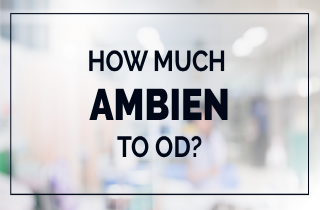Can you prevent an unintentional Ambien overdose? Yes.
In this article, we cover how Ambien overdose happens as well as general guidelines for how much Ambien is safe. If you have questions about Ambien overdose, we invite you to ask them at the end. We try to respond to all legitimate Ambien questions with a personal and prompt reply.
How does Ambien overdose happen?
You can take too much Ambien (zolpidem) for a number of reasons. If you suffer from insomnia, you may take more Ambien than directed to try to get relief. In fact, if you increase the amount or the frequency at which you take Ambien, it’s easy to unintentionally overdose on Ambien.
Another way to OD on Ambien is to try to get “high” on Ambien, particularly since euphoric effect takes larger amounts of the drug than are normally prescribed. And some people attempt to OD on Ambien as a way to commit suicide or self-harm.
Ambien overdose – How much is too much?
The amount of Ambien you need to take to overdose depends on your body weight, previous exposure to the medication, and other factors. But there are some basic guidelines you can follow.
1. Maximum daily dosage
You’ll usually only be given 5-10 mg once a day, to be taken directly before you go to sleep. 10 mg is the normal maximum daily dosage.
2. Avoid high doses of Ambien
At 70 mg, you may begin to experience serious adverse effects of taking too much Ambien, although this dose is low enough that you probably won’t suffer permanent injury. The amount needed to overdose can range from 400-600 mg. But even this dose probably won’t kill you – the reported fatal dose for Ambien is much higher, at 2000 mg.
3. Don’t experiment with different ways of taking Ambien
Ambien abuse does increase the risk of death and overdose. Zolpidem should only be taken swallowed as a whole pill, and only in the doses recommended by your doctor. You’re much more likely to overdose or experience adverse effects of Ambien when you chew, crush, inject, or snort Ambien pills. And avoid mixing Ambien and alcohol. Sedative effects are more intense when the two are combined.
Ambien overdose complications
The most dangerous complications of taking too much Ambien are related to breathing and heart rate. At very high doses, Ambien may effect your breathing or heartbeat. But taking more Ambien than recommended can cause memory loss and acting out physical behaviors in your sleep (like driving) that can put you in danger. Excessive tiredness and dizziness may also put you at risk of accidents.
Ambien overdose prognosis
The prognosis for Ambien overdose is usually good. It takes a very high amount of Ambien to overdose, and even more to experience long-term health effects or death. While taking more Ambien than directed can be unpleasant and dangerous because of the degree to which it impairs you, medically speaking in terms of OD liability, Ambien isn’t a very dangerous drug.
We understand it is difficult to talk to someone about your struggle. Check out our interactive Virtual Consultant to receive your treatment options easily.
Confidential and Free.
Ambien overdose amount questions
Addiction to Ambien (zolpidem) is another risk of abusing the drug. If you feel that your zolpidem use is throwing you off the rails…you can take your life back on track! Learn more about the addictive potential of Ambien, how you can seek help and find the best rehab program for you, as well as what the rehabilitation therapies and options you can choose from in our comprehensive GUIDE on Zolpidem Addiction Treatment Programs and Help.
All your questions about safe amounts of Ambien in your system are welcomed here. We are happy to try to help answer your questions about Ambien, and will try to respond promptly.









Related Posts